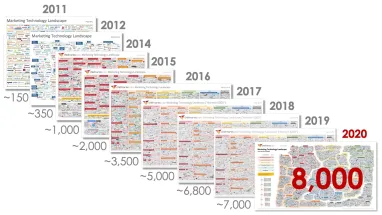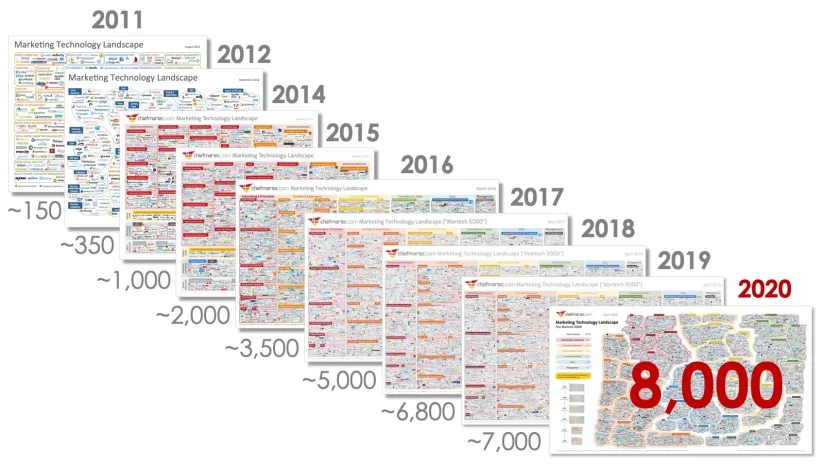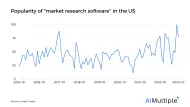Marketing Analytics with AI in 2024: Complete Guide


There were 150 marketing tools in the market in 2011 and this number reached thousands as of today. Customers were a single data point in 2000s while now we have rich time series data on every user. Artificial intelligence powered tools are required to harmonize data and complete automated predictive analytics.
Why is AI relevant for marketing analytics now?
You need too many tools!
Marketers have access to more tools and channels than ever. It would take a genius to be up to date on all the tools and technologies that is becoming available.
The proliferation of tools creates the complex task of unifying their output for analytics. Normally this involves taking CSV backups, writing scripts and other data janitor work.
You have too much data!
Similarly, data that marketers have to work with on a day to day basis has grown exponentially in recent years both in terms of volume, diversity and complexity and the task of processing and analyzing of that data has long surpassed human capabilities. So marketers relied on heuristics and shortcuts for decision making.
Manual analytics is not scalable!
Even if you were extremely quick with your analytics capabilities, it takes effort to implement the necessary optimizations in your marketing communication and product. With many tools and ever more complicated data, your time is spent on analysis rather than improving marketing outcomes.
Challenges faced by pre-AI Marketing Analytics
Here are a few identified problems that a business must actually look out for in marketing analytics.
Improper data interpretation
This comes as the top most reason for the failure of marketing analytics. Data is only good as the analyzer and therefore interpretation of data is of vital importance. Misinterpretation of facts, lackluster notes and insights can lead to error in decision-making ruining the whole process in a marketing strategy.
Data Integration
Integrating data from your various marketing platforms under one single hub is often a challenge. A holistic view of customers under one focal point can make marketing analytics more dependable. Therefore, integrating data from various disciplines in an organization is of absolute importance.
Data Silos
In IT, silos refer to data not shared with other relevant streams of information. For example, metrics from SEOs and PPCs are often reported separately as compared to an email marketing campaign. The reasons may differ as to why they are represented separately or individually, but, in reality, the collective convergence of such information can lead to a genuine marketing strategy.
What is the solution?

However, thanks to developments in AI, today’s machines have analytics capabilities far beyond any human. It is a great opportunity to use AI to make sense of all the data and use it to improve marketing performance.
AI can play a role at every step of the way in marketing analytics. AI makes it easier to connect and bring together disparate data, automate data models for scale, and shrink optimization cycles by automating insights. For example, behavioral analytics is a common AI application. By embracing AI, marketers can reduce their time to get answers to the questions they should be asking. Furthermore, optimizing the benefits of automation allows for faster experimentation and optimization.
Internet of Behavior (IoB) is another tool used by marketers to influence and influence consumer decisions.
Where is Artificial Intelligence making the difference?
AI technologies help simplify marketing analysts’ job while increasing their effectiveness
AI simplifies analytics and makes it more Natural Language friendly
It takes longer to build models than just asking simple questions. New Natural Language powered analytics platforms can create Natural Language interfaces to complex queries.
AI can help merge disparate data sources to identify patterns and predict future results
With the help of historical data, AI is able to learn about the customer’s past behavior and determine the probability that a customer will churn. With the help of such analytics, marketers are able to determine the future course of action for the organization.
Domo is an AI vendor that provides a solution for merging marketing data for analytics. They recently unveiled Roboto, an AI-powered predictive analytics engine to power marketing alerts and predictions.
AI paves the way for Social Media Analytics
AI technologies like Natural Language processing and computer vision aim to understand, analyze and generate responses, which ultimately enables social media marketers to develop meaningful marketing outcomes and highly curated insights in real-time.
For example, AI vendor unmetric allows companies to analyze any competitors’ social media activity in detail, helping uncover new social media strategies.
AI enables automated decision management
The analysis takes time to complete and implementing the results of analytics is time-consuming and not scalable. AI techniques can be used to build models that combine analytics and decision-making, continuously improving marketing effectiveness.
For example recommendation engines like Dynamic Yield analyze the effectiveness of their recommendations in real-time and tweak their recommendations accordingly. These personalized and targeted offers provide customers with exactly what they need instead of bombarding customers with irrelevant offers.
AI helps in gaining insights into customers’ opinions and preferences
The primary objective of marketing analytics is to gain insight and understanding into the customer’s preferences. Marketers want to understand what is it that their customers like, and what they think of their products. For example, chatbots can be used to respond to customers in real time.
Furthermore, customer reviews are no longer mountains of text that can not be analyzed. Companies like Gavagai using Natural Language Processing, can analyze thousands of reviews and summarize findings in simple sentences. This helps marketers understand the true sources of customer satisfaction and dissatisfaction.
AI can make help your wider organization understand and use marketing analytics
Simplified interfaces that users can speak to are vastly better than spreadsheets. Ease of analytics empowers organizations to solve their own problems and rely less on dedicated marketing analytics teams.
A Case in point
The Company/Client
A global media and entertainment company wanted to identify and track the true engagement of their artists across social platforms; then compare and contrast these engagements across geographies in terms of competitiveness.
The Approach
WNS used proprietary machine-learning algorithms to benchmark artists on the basis of their ‘virality’ using social media engagement scores (for instance, the number of fans, favorites, likes, dislikes, and comments). 1600 artists were tracked across 7 social media platforms and 13 geographies. They used these technologies:
- Text analytics for sentiment and theme classification
- Face detection and AI for audience analytics
- Language detection and translations
In this case, artificial intelligence had the power to impact top-line brand equity in real time.
The Rundown
AI plays a very important role in everything from data integration to generating insights. It is with the help of AI that marketers are able to scale up faster – while never missing out on an insight. Today AI has shrunk optimization cycles into hourly and daily windows, which were initially sometimes weeks or even months.
Glossary of important terms that we just assumed you knew, feel free to read for more explanation
What is marketing analytics?
Marketing Analytics is all about optimizing insight from the data collected to make marketing more efficient and effective. This involves investigating, analyzing, and measuring marketing efforts so that marketing dollars are not wasted and marketing campaigns are agile and flexible. In order to accomplish this, marketers use advanced analytics that focuses on customer behavior, customer intelligence, and marketing optimization – among other things.
Marketing Analytics or marketing data analytics is a critical and vital activity for a business, where market information is collected and studied so that the correct marketing plan or strategy can be formulated and practiced. However, marketing analytics is not just limited to strategy formulation. It can measure the performance of your marketing efforts and make necessary adjustments to accelerate the growth of a business.
The goal of marketing analytics is the optimization and measurement of marketing activities. Having said that, it relies on both on-site and off-site indicators to evaluate performance reports. The aim, of all this, is to find the ‘sweet spot’ where the actual offsite and onsite efforts converge to produce a ‘change’ in marketing efforts, by employing a particular strategy.
What is AI?
AI is aimed at reaching an ‘independent, intelligent scalable system full of possibilities without the pitfalls and errors made by humans.
Why is AI critical for marketing analytics?
As marketing grows in complexity—with tracking marketing effectiveness and ROI operating under a variety of constraints, including budgets, privacy policies, and more, optimization becomes extremely crucial. Additionally, there is a need for agility, as businesses attempt to adjust their functioning in real-time, while they are actively engaged with customers. In this scenario, organizations need to make optimization a strategic priority and try and analyze how they can use technology to achieve marketing optimization goals.
It is needless to say that optimization runs on the power of analytics, with AI and machine learning on the leading edge. Analytical optimization enables organizations to use various mathematical techniques to determine how to best direct marketing efforts under constraints, with the objective of reducing inefficiency and defining alternatives for improvement. Analytics coupled with optimization enables organizations to consider variables, use different tools to run “what-if” scenarios, and apply optimization strategies to balance goals and constraints.
AI techniques such as machine learning help organizations filter through large and diverse sets of data volumes to arrive at a precise definition of constraints. Predictive analytics aided by machine learning can be evaluated by organizations to gain a clearer understanding of how to optimize marketing to desired outcomes.
AI and machine learning are extremely complementary to marketing because of the efficiency and adaptability they bring to marketing analytics and the reporting system. This is especially useful when it comes to setting up a foundational layer on which a panoramic view of customer touch points can be built.
AI can effectively replace spreadsheets, reports, one-off dashboards, or multiple systems needed earlier to go to get a holistic view of marketing. This makes the integration of any new data extremely fast, as compared to earlier. This also means marketers can start reporting on their newest campaigns immediately.
If you want to know more about how AI is shaping marketing, please check out our section on marketing.

Cem has been the principal analyst at AIMultiple since 2017. AIMultiple informs hundreds of thousands of businesses (as per similarWeb) including 60% of Fortune 500 every month.
Cem's work has been cited by leading global publications including Business Insider, Forbes, Washington Post, global firms like Deloitte, HPE, NGOs like World Economic Forum and supranational organizations like European Commission. You can see more reputable companies and media that referenced AIMultiple.
Throughout his career, Cem served as a tech consultant, tech buyer and tech entrepreneur. He advised businesses on their enterprise software, automation, cloud, AI / ML and other technology related decisions at McKinsey & Company and Altman Solon for more than a decade. He also published a McKinsey report on digitalization.
He led technology strategy and procurement of a telco while reporting to the CEO. He has also led commercial growth of deep tech company Hypatos that reached a 7 digit annual recurring revenue and a 9 digit valuation from 0 within 2 years. Cem's work in Hypatos was covered by leading technology publications like TechCrunch and Business Insider.
Cem regularly speaks at international technology conferences. He graduated from Bogazici University as a computer engineer and holds an MBA from Columbia Business School.
To stay up-to-date on B2B tech & accelerate your enterprise:
Follow onNext to Read
Top 3 In-house Web Traffic Analytics for Marketing in 2024
Retail Analytics in 2024: Uncover Retail Insights with AI
The Ultimate Guide to Sales Analytics in 2024
half of the things you adore are 503 / 404 / aboutblank
Hello, Hans. Our link to Wacul was the only dead link, which we have removed. Thank you for pointing it out.

Comments
Your email address will not be published. All fields are required.